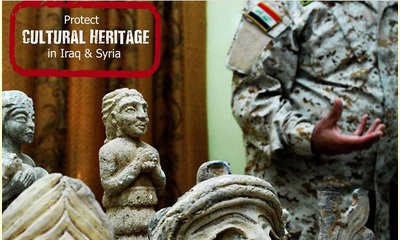|
|
UNESCO llama a proteger patrimonio cultural de Siria e Iraq
un article par Centro de Noticias de la ONU
La directora general de la UNESCO llamó hoy a
crear zonas culturales protegidas en los sitios de
patrimonio de la humanidad de Siria e Iraq,
afirmando que aún no es demasiado tarde para
empezar a actuar. 
foto: UNESCO
click on photo to enlarge
En una conferencia internacional sobre las
amenazas al patrimonio cultural de esos países,
Irina Bokova sugirió comenzar por la ciudad siria
de Alepo, inscrita en la Lista del Patrimonio
Mundial, y mencionó especialmente la Mezquita
de los Omeyas.
Bokova denunció la persecución de las minorías,
los ataques contra el patrimonio cultural y el
tráfico ilícito de bienes culturales, como “parte de
una estrategia de limpieza cultural deliberada de
una violencia excepcional”.
“La solución a esta crisis no puede ser puramente
militar, para combatir el fanatismo debemos
también reforzar la educación, baluarte contra el
odio, y proteger el patrimonio, que contribuye a
forjar una identidad colectiva”, puntualizó la titular
de la UNESCO.
Entre las demás medidas propuestas durante el
evento, al que acudieron casi 500 representantes
políticos, curadores de arte, profesores
universitarios y expertos en conservación, figura la
de dictar una prohibición internacional relativa al
comercio de antigüedades procedentes de Siria.
( Clickear aquí para la version inglês)
|








|
DISCUSSION
Question(s) liée(s) à cet article:
How can there be a political solution to the war in Syria?,
* * * * *
Commentaire le plus récent:
For other articles on this subject, click here .
In the following article, Wilhelm Langthaler, a Co-convener of PeaceinSyria.org comments on the spirit emerging from the “All Sides Consultation for Political Solution” in Vienna.
Now that the “All sides Consultation for a Political Solution in Syria” is accomplished and is being recognized by all the participants as a success that deserves continuation, the time has come to draw a balance not only of the conference itself, but also of its wider significance. The very fact that around two dozen people from the most diverse and conflicting backgrounds of Syrian society came together and consulted how to overcome the civil war tearing apart the country is extraordinary. But the spirit emerging from the debates reaches far beyond the objective of this single event, giving hope that a movement for a political solution is gaining momentum.
Exchange among the people – not power-brokering
First of all, let us recall the aim of the “All Sides Consultation for a Political Solution” which took place in the “Peace Castle Schlaining” close to Vienna, Austria, from 7-10 March, 2014. The idea was to give a voice to Syrian society in its full diversity, voices emerging from the people who have been silenced and excluded by the powerful. It was not intended to hold negotiations between the conflicting sides and their global and regional sponsors as has failed in Geneva. A consultative forum of personalities not directly representing the sides involved but indeed representing the societal richness was called upon to explore ways to stop the catastrophic bloodshed.
Thus we were not in search of sophisticated and well-balanced formulae of compromise pleasing the foreign powers involved (something which might, however, be necessary to reach in other places), but to give answers concerning how the full rights of the people might be guaranteed. The quest for these rights is what is thought to have sparked the conflict and is at the same time key to ending what has turned into a fratricidal war pitting the components of society against the other, a conflict additionally fuelled by massive international involvement. As Naser al Ghazali, one of the Syrian members of the preparatory committee hailing from Daraa, put it in his introduction: “Democratic rights are not negotiable. . ... continuation.

|
|









